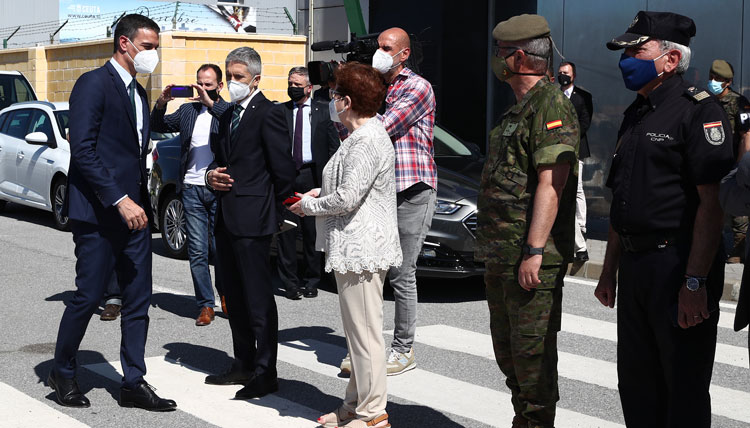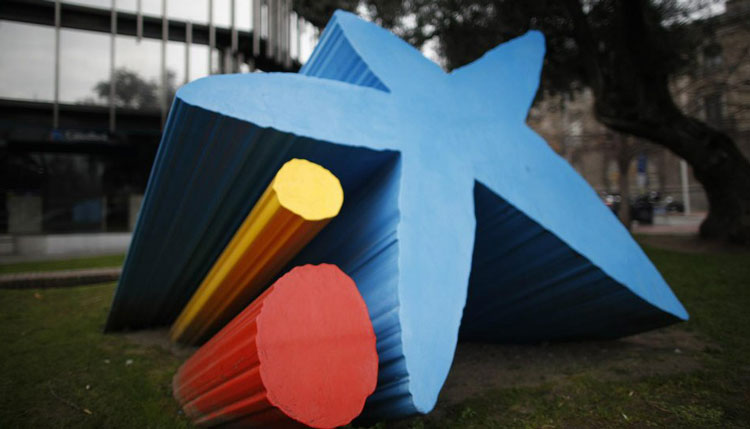Luis Ayllón
The diplomatic crisis between Spain and Morocco took a new step yesterday, after Rabat recalled its ambassador in Madrid, Karima Benyaich, who hours earlier had been summoned to the Spanish Ministry of Foreign Affairs by the minister, Arancha González Laya.
The seriousness of the conflict caused by the arrival of some 8,000 irregular immigrants on Spanish territory, in the face of the passivity of the security forces of the Maghreb country, forced the president of the government, Pedro Sánchez, to travel to Ceuta and Melilla, and to call for solidarity from the European Union.
The government, which is reaping the consequences of having clandestinely brought the leader of the Polisario Front, Brahim Ghali, to Spain for hospitalisation, without first notifying Rabat, mobilised to try to resolve the biggest diplomatic crisis with Morocco since the assault on the island of Perejil in July 2002.
Pedro Sánchez issued an institutional declaration, without the presence of journalists, in which he announced his intention to travel to the two autonomous cities, assuring that his government will defend “the territorial integrity of Spain with whatever means necessary”. “The territorial integrity of Spain, its borders, which are also the external borders of the EU, will be defended by the Spanish Government in the face of any challenge and together with our European partners,” he said.
In Ceuta, which is experiencing convulsive days due to the arrival of immigrants, many of them wandering the streets of the city, Sánchez was received with hostility by groups of people who booed him and called for his resignation.
Accompanied by Minister of Interior, Fernando Grande-Marlaska, he met with the president of Ceuta, Juan Jesús Vivas, and the government delegate, Salvadora Mateos. Vivas called on Sánchez to shield the border from what he described as an “invasion”.
Afterwards, the president and the Minister of the Interior travelled to Melilla, where Sánchez met with the president of Melilla, Eduardo de Castro, and the delegate in Melilla, Sabrina Moh.
In his institutional declaration in the morning, the head of the Executive avoided naming Morocco, although shortly afterwards, the Minister of Foreign Affairs, Arancha González Laya, summoned the Moroccan ambassador, Karima Benyaich, to her office in the Palace of Santa Cruz, to express Spain’s ‘displeasure and rejection’ of the ‘massive’ arrival of Moroccan immigrants in Ceuta.
González Laya told the press that he had reminded the ambassador that “border control has been and should continue to be the joint responsibility of Spain and Morocco”. I have expressed to her,” he said, “the government’s desire to look to the future, to prevent acts like these from happening again. I have also asked for a commitment that all those citizens who have entered our country illegally can continue to return, in accordance with the protocols in force between Spain and Morocco”.
The minister reiterated to the Moroccan diplomatic representative Spain’s desire to maintain “good neighbourly relations, close relations as neighbours and friends”.
At no time have the Spanish authorities wanted to link the avalanche of immigrants caused by Morocco with the decision to hospitalise Ghali in Logroño, but Rabat warned days ago that this could have consequences. The Moroccan ambassador herself told Europa Press yesterday, moments before attending her appointment with the Foreign Ministry, that there are acts that have consequences, “and they have to be assumed”, in a veiled reference to the case of the Sahrawi leader.
The Moroccan government reacted to the summons made to its ambassador, calling her for consultations in Rabat, which represents a further step in the escalation of the diplomatic conflict.
The Ministry of Foreign Affairs did not confirm whether Spain will respond with the same measure by recalling its ambassador in Rabat, Ricardo Díez-Hochtleiner, and limited itself to indicating that González Laya held talks “with Moroccan authorities”, without specifying whether she did so with her counterpart, Nasser Bourita.
It is also unknown whether Sánchez spoke with the Moroccan Prime Minister, Saadeddine Othmani, and there was no news late yesterday afternoon that the King had spoken with Mohammed VI. Traditionally, when a conflict arose between the two countries, it was common for the monarchs to talk to try to redirect the situation, always with the knowledge of the government.
Almost at the same time that the Moroccan ambassador’s call for consultations was announced, at around five o’clock in the afternoon, the ‘situation committee’ created yesterday in the Council of Ministers to deal with the crisis was meeting. The committee is chaired by the First Vice-President, Carmen Calvo, and its members include the Ministers of Foreign Affairs; Defence; Territorial Policy and Public Function; Social Rights; Inclusion, Social Security and Migration; and the Interior, who yesterday was represented by the Secretary of State for Security, since the minister, Fernando Grande-Marlaska, travelled to Ceuta to accompany Sánchez on his visit. The director of the CNI also participated in the committee meeting.
Carmen Calvo stated that “what has taken place, which is an aggression against our borders, and this cannot form part of the good relations with Morocco, but we will continue to maintain them because we are close neighbours”.
While trying to solve the problem created by the flood of migrants, the Spanish authorities are seeking solidarity from the European Union. Support came from the President of the European Council, Charles Michel, and the EU’s High Representative for Foreign Policy, Josep Borrell. Both spoke on the phone with Pedro Sánchez. Other EU leaders, such as the Commissioner for Home Affairs, Sweden’s Ylva Johansson, and the Commissioner for the Promotion of European Life, Greece’s Margaritis Schinas, also came out in support of our country, recalling that Spain’s borders are Europe’s borders.
By contrast, in the midst of the crisis, the Spanish government saw Joe Biden’s administration underline in a call by US Secretary of State Antony Blinken to the Moroccan foreign minister to discuss Israel and Gaza ‘the importance of the strong bilateral relationship and Morocco’s key role in fostering stability in the region’. Joe Biden has not reversed Donald Trump’s decision to recognise Morocco’s sovereignty over Western Sahara.
Within Spain, opposition parties expressed support for the integrity of Ceuta and Melilla, but criticised the government for its handling of a crisis in which the interior minister and the foreign minister reportedly disagreed on whether Ghali should be taken into a Spanish hospital, as Grande-Marlaska was opposed to it.
From an operational point of view, the government deployed the army and increased the number of police and civil guards in the area to prevent new arrivals, while at the same time returning the adults who were entering. By mid-afternoon yesterday, the Interior Ministry reported that 4,000 people had been returned to Morocco, half of those who entered. However, it is estimated that at least 1,500 minors who cannot be returned are still in Ceuta.
Morocco resumed control of its borders yesterday, a very different attitude to that maintained throughout the early hours of Monday morning and throughout the day, as reflected in a video distributed on social networks, in which Moroccan agents were seen opening the gates of the border crossing for the entry of immigrants into Spain.
Just yesterday, the Council of Ministers approved the delivery of 30 million euros to Morocco to help finance the Moroccan police. The government frames this aid as part of its policy of “cooperation and collaboration” with the countries of origin and transit of irregular immigration. Similar disbursements already took place in 2019.







